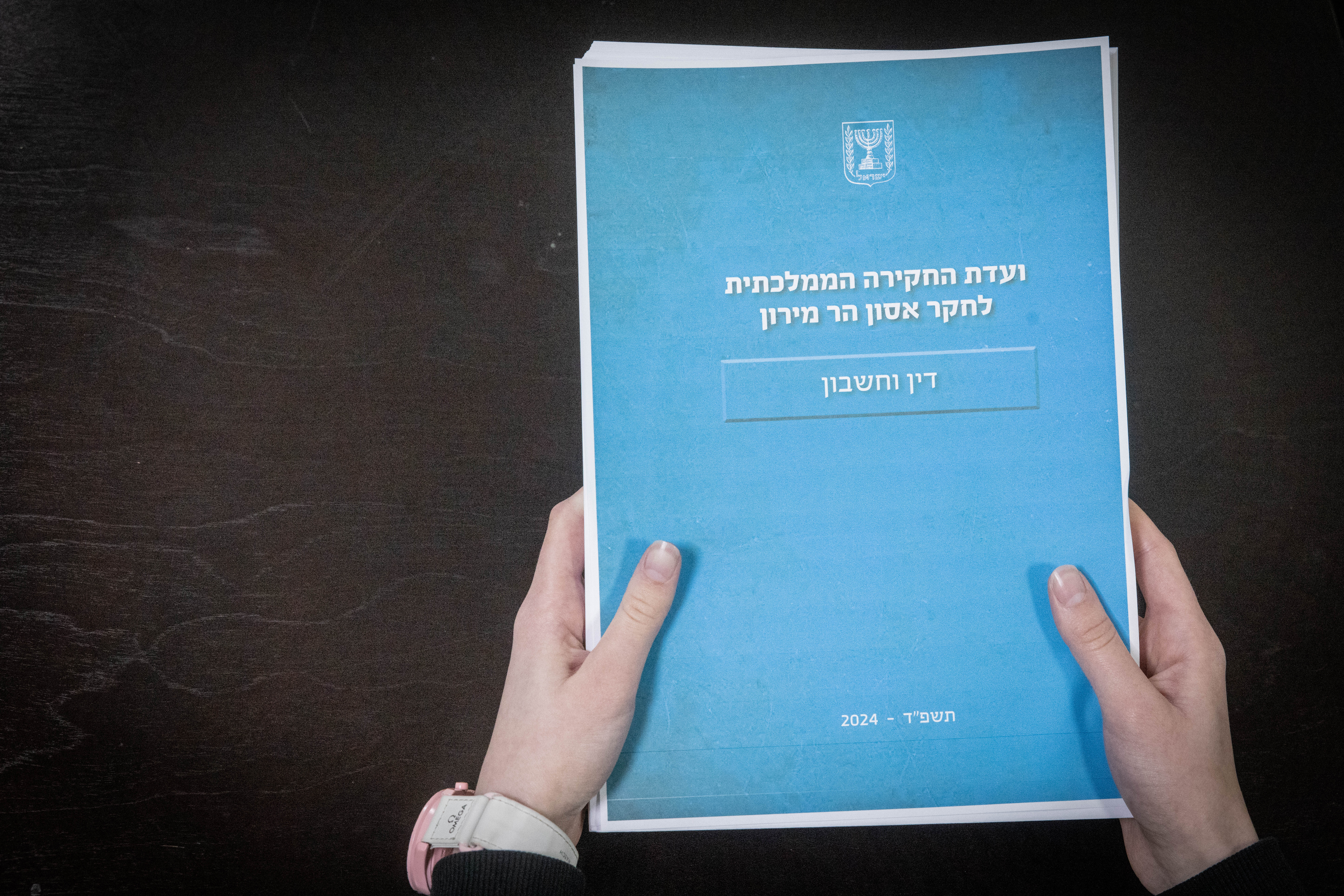What the Mount Meron Disaster Commission of Inquiry Teaches us about a Future Commission of Inquiry on the October 7 Massacre
Israel's Commission of Inquiry into the Mount Meron disaster released a report that criticizes shortcomings in the culture of accountability in Israel. The Committee distinguished between personal responsibility and ministerial responsibility and offered important recommendations, including for police operations during mass events.

Meron Disaster Inquiry Committeee Report Photo by Chaim Goldberg/Flash90
Israel's Commission of Inquiry into the Mount Meron disaster released a report (almost three years after the disaster) which proves, once again, what Israelis already know: there is no culture of public accountability in Israel. Elected and professional public servants take no shame in deflecting responsibility. The report demonstrates that most public figures understand "responsibility" in the narrowest possible sense – direct blame. According to the approach of the commission, if leaders did not directly cause the disaster, they bear no responsibility for what happened. The inability to translate the notion of a public servant's responsibility into a notion of accountability is a “childish” feature of Israeli leadership.
The commission devoted a section of the report to distinguishing between different types of responsibility. In line with previous commissions of inquiry in Israel, there is a distinction between ministerial responsibility and personal responsibility. Ministerial responsibility refers to the broad public responsibility for everything which falls under the authority of the officeholder, whether elected or appointed, and includes events that take place under their purview even without their knowledge or direct involvement. The commission opted not to deal with this type of responsibility, but leave it to the public arena. It focused instead on what is called personal responsibility, which can be direct or indirect, and contains an element of blame. Direct personal responsibility means that an action or inaction by the office holder led to calamity. Indirect personal responsibility refers to a case where the calamity was caused by a subordinate, but the calamity can still be linked to an act or omission by the office holder.
Personal responsibility primarily, and in the narrowest sense, relates to whether the office holder acted according to the law. Beyond that, personal responsibility is examined in how the office holder, whether elected or appointed, operates and functions in three dimensions: the institutional management dimension (publication of guidelines, ensuring the existence of monitoring and control mechanisms, proper appointments of officials); the decision-making dimension (regular and proper decision-making processes); and in the ethical dimension where the office holder has a duty of loyalty to the public interest and a duty of care. Regarding public servants, there is also the professional dimension – meaning that a person has the appropriate qualifications and experience to fulfill their role. The committee notes that every public office holder – elected or appointed – needs to take a broad approach to fulfilling their role, outlining the need to act with what is called in Hebrew a "rosh gadol" (taking personal initiative and responsibility over the big picture) and also has a special obligation to learn the subject in their area of responsibility in cases involving risk to human life. It is not enough to simply act as their predecessors did in the role.
In its conclusions, the report found that the Prime Minister, the former Minister of Public Security, the Minister of Religious Affairs, the Police Commissioner, and others bear personal responsibility for the disaster. Similar to previous commissions, while the report adopted a sharp and critical tone in its conclusions, its recommendations were cautious and restrained. Regarding Prime Minister Netanyahu, although it found that he bears personal responsibility, it decided not to make operative recommendations due to the unique nature of the elected position. In other cases, the commission was let "off the hook" by the fact that certain individuals no longer hold the same office as they did at the time (for example, it was recommended only that former-Minister of Public Security Amir Ohana not serve in this particular role, which would not prevent him from being a minister in any other position in the future). In the end, the Commission's report focused only on those who are specifically, directly responsible for the disaster, but the fact that only they are recommended to be removed from their positions demonstrates a tendency to blame the people holding the lower positions without demanding accountability of higher officials.
The commission did offer important recommendations on the institutional level – systemic ones that could prevent the next disaster, for example, regarding the functioning of the police in mass events, but these recommendations will remain in the shadows. They will not receive extensive media coverage, the public will not demand their implementation, and the government will be able to delay their implementation.
With this in mind, there are important lessons that must be learned ahead of a future commission of inquiry that will inevitably take place regarding the October 7 massacre. The most important lesson is that the public needs to demand accountability from elected and professional leaders in real time and not to wait for the commission’s report. In the context of the October 7 attack, the Commission of Inquiry will be of great importance in giving a voice of the collective trauma experienced and drawing professional and systemic lessons that will prevent future failures and disasters. But when it comes to holding individual leaders accountable, by the time the commission report is published, it is reasonable to assume that many key officials will no longer hold their positions, particularly at the professional level, but likely also at the political level. Among those elected officials who do continue to serve – it will not be the commission's place to remove them from their positions. The Meron Commission of Inquiry reminds us that while an inquiry is critical, it is not sufficient on its own, and our hopes for a national reckoning of the October 7 events should not be pinned on the findings of the future Commission of Inquiry.
